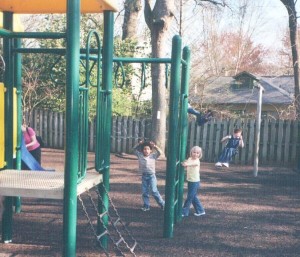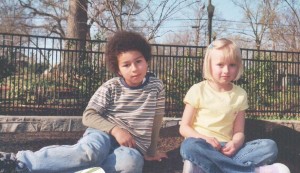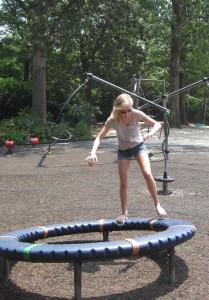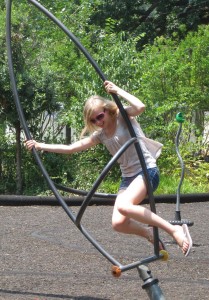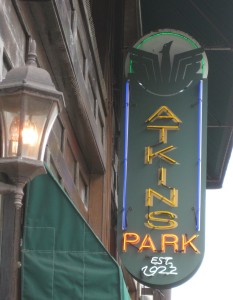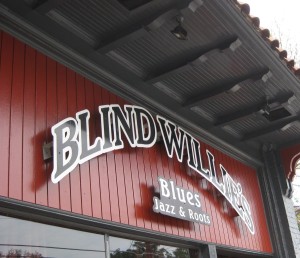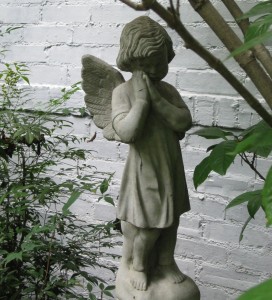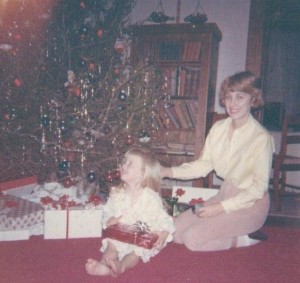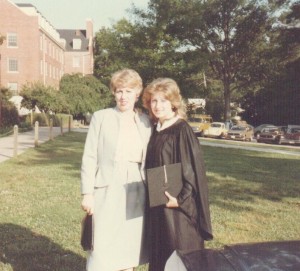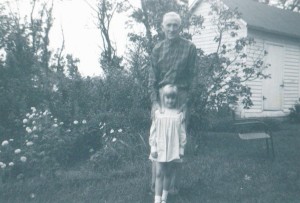This year, H’s sister and her husband brought their three-month old baby to Cape Cod. We were not so brave. We waited until our daughter was two and a half. The year before, we had attempted our first family beach trip, to the Outer Banks, just the three of us. While it was a joy to experience the sun and sand from D’s fresh perspective, it was not a vacation. The demands of our beautiful child, limitless as always in those early years, were more difficult to satisfy, being away from home. We were simply caregivers in an alien setting, and there was minimal opportunity for relaxation or enjoyment. When D was awake in the hotel, which was most of the time, H worried she would awaken or annoy our neighbors. On the rare occasions when she finally succumbed to sleep, these same neighbors typically awakened her and annoyed me. There was great collective frustration all around.
That trip made me reassess the Cape Cod complex that H’s family has visited for over thirty years. Some cottages are covered in white clapboard, others in weathered cedar shakes. All are small but charming. They cluster, like the homes of a compact village, around two spacious central greens and a pool. It’s timeless, quintessential Old Cape Cod, exactly the picture conjured by that 1950s Patti Page song of the same name. An immensely wide beach, unusual for Truro, provides a buffer zone from the water. Rather than the pounding surf of the Atlantic, there is the relative tranquility of the bay. It suddenly hit me that this was a decidedly welcoming environment for small children and their parents.


I realized that at the Cape there would be willing, helping hands, certainly those of Grandma and Grandpa, perhaps those of H’s sister and her husband. I wasn’t hoping to hand my child over completely, only grateful for any assistance that might be offered. I also knew by this time that our daughter tended to behave better when she knew there were other eyes on her besides those of Mama and Daddy.
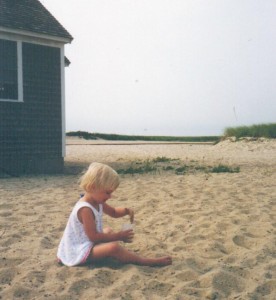
H’s family’s adopted Cape Cod village opened its arms to welcome our daughter, and for her it was love at first sight. As children sometimes do, she appreciated the simplest things. She found it supremely entertaining to sit outside our cottage, pouring sand into a cup; she didn’t even need a pail or shovel. We would send her over to her grandparents’ cottage for cooking oil or butter, and she relished the responsibility. H would use the walkie-talkie to tell his parents D was on her way, and we’d keep her in our sights during her short journey. (There are no phones in the cottages, and before we were all so fiercely entangled in the web of technology, this meant an actual break from the typical work-a-day world.) Grandpa would signal D’s return, and she would arrive flushed and happy, more mature than when she had left.
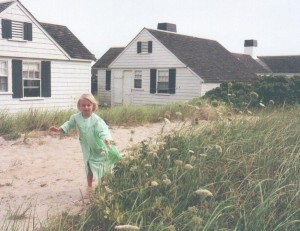
There is a real sense of community in our vacation village, because families tend to return for the same week every year, and friendships are nourished. Most of the parents who are now H’s and my age grew up vacationing here with their families. Two sweet and thoughtful sisters, four and five years older than D, took her under their wings on our first visit. Through these girls, D became acquainted with kids of all ages. Even now, with one sister in college and the other a senior in high school, they remain close. All the kids look forward to their annual reunion. Friendships pick up seamlessly, as though no time has passed.
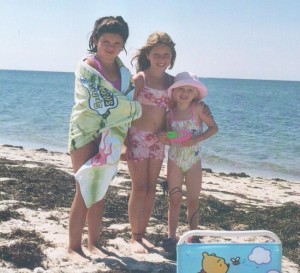
Above, D and her friends float in the calm shallows of the bay, a pastime that never gets old. Sometimes the waves kick up and boogie boards come in handy, but the water is never as rough as the ocean. Having grown up with the Cape’s prodigious seaweed, none of the girls finds it objectionable (as I did, at first). Neither are they squeamish about the amazing variety of life in the water, which includes tiny shrimp, eels, sea worms, insects we refer to as potato bugs, and a vast number of unidentifiable, speedily swimming slimy things. Some years there are hosts of jelly fish, but typically these are the small non-stinging kind, drifting in the water like blobs of translucent white paste. D and her friends have always collected these in buckets, examined them, and returned them to the water. The blue crabs that lurk in the sand are ready to rumble, pincers poised for an unsuspecting, intrusive toe. Occasionally we see multitudes of horseshoe crabs, the dinosaurs of the crustacean world. And there are the furry-looking spider crabs, of which D is inexplicably fond, despite her distaste for true arachnids.
At low tide, the water of the bay empties out nearly completely, so it’s almost possible to walk across to Provincetown. Starfish, sand dollars and scallop shells are revealed among the reeds. It’s time for D and her friends to build expansive sand compounds, which they populate with feisty hermit crabs and slow-moving moon snails. Before long, the tide turns and begins to inch back in. Islands of sand appear and gradually diminish. Soon the bountiful and diverse life of the bay is submerged once again.


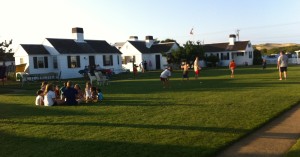

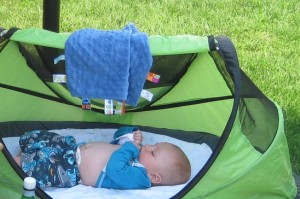
This year, it was a blessing to welcome the new baby on the beach. It was also a blessing, at this stage of my life, to be the baby’s aunt rather than mother. D’s newest cousin looked out on the summer landscape from the shade of his peapod tent. When it appeared that even from that sheltered vantage point, the bright light made him cranky, Grandma and Grandpa went on a mission to Provincetown. They returned with infant sunglasses that strapped around the head with an elastic ribbon. This made their grandson, and all of us, much happier.
I had almost forgotten that magical essence of Baby. What a gift is a baby’s smile! How rewarding it is to share in his squeals of delight! Our darling nephew was just discovering his unique voice, and his vocal experiments were enchanting and enthusiastic. I had nearly forgotten the incomparable warmth and sweetness of a baby in my arms.
D treasured the time she spent with her cousin. For one week a year at least, he was, and will be, a substitute for the brother she never had. And I like to think that next year, when he’s old enough to walk, he will follow in our girl’s sandy footprints. I can see the two of them now, wandering through the sea grass, making their way down to the bay.







